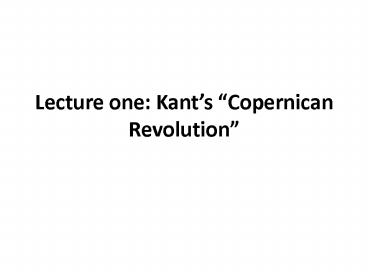Lecture one: Kants Copernican Revolution - PowerPoint PPT Presentation
1 / 24
Title:
Lecture one: Kants Copernican Revolution
Description:
inside the bounds of sense experience. the metaphysics of experience. transcendent. outside the bounds of sense experience. metaphysics as traditionally conceived ... – PowerPoint PPT presentation
Number of Views:181
Avg rating:3.0/5.0
Title: Lecture one: Kants Copernican Revolution
1
Lecture one Kants Copernican Revolution
2
Immanuel Kant
- 1724-1804
- the sage of Königsberg
3
Problems with the Enlightenment
- philosophical disagreements
- philosophy leading to skepticism
- science leading to reductive nihilism
4
Critique of Pure Reason (1781)
- agrees with the skeptics about the failure of
reason to transcend experience - agrees with the scientists about the
applicability of materialist, mechanical causal
principles within the world of experience, but
denies that they can apply beyond the world of
experience
5
Kants two worlds
- the world of experience
- a supersensible, transcendent world beyond the
world of experience
6
a priori knowledge
- a priori
- - prior to experience
- - necessary and universal
- a posteriori
7
The problem
- Hitherto it has been assumed that all our
cognition must conform to objects. But all
attempts to extend our knowledge of objects by
establishing something in regard to them a priori
by means of concepts have, on this
presupposition, ended in failure. (Bxvi)
8
The solution
- We must therefore make trial whether we may not
have more success in the tasks of metaphysics, if
we suppose that objects must conform to our
cognition. (Bxvi) - Kants Copernican Revolution
9
More quotes
- reason has insight only into that which it
produces according after a plan of its own
(Bxiii) - we can know a priori of things only what we
ourselves put into them (Bxviii)
10
Kants account of cognition
- Two faculties
- 1. active faculty of the understanding concepts
- 2. passive faculty of sensibility intuitions
- Thoughts without content are empty, intuitions
without concepts are blind (A51/B75)
11
The two worlds again
- the world of experience appearances (ideal)
- supersensible, transcendent world things in
themselves (really real)
12
Kant quote
- But this deduction of our power of knowing a
priori has a consequence which is startling, and
which has the appearance of being highly
prejudicial to the whole purpose of metaphysics.
For we are brought to the conclusion that we can
never transcend the limits of possible
experience, though that is precisely what this
science is concerned, above all else, to achieve.
(continued)
13
Kant quote
- In other words, our a priori knowledge of
reason has to do only with appearances, and must
leave the thing in itself as indeed real per se,
but as not known by us. (Bxix-xx)
14
Two types of metaphysics
- immanent
- transcendent
- inside the bounds of sense experience
- the metaphysics of experience
- outside the bounds of sense experience
- metaphysics as traditionally conceived
15
The key distinction
- knowable
- unknowable
- empirical objects
- appearances
- (immanent metaphysics)
- non-empirical objects
- things in themselves
- (transcendent metaphysics)
16
The key distinction revised
- knowable
- unknowable , yet thinkable
- empirical objects
- appearances
- (immanent metaphysics)
- sensible world
- non-empirical objects
- things in themselves
- (transcendent metaphysics)
- intelligible world
17
Kant quote
- though we cannot know these objects as things in
themselves, we must yet be in position at least
to think them as things in themselves (Bxxvi)
18
How this safeguards morality
- the same will each human will is thought of in
the appearance (in visible actions) as
necessarily subject to the law of nature
mechanistic causality and to this extent not
free, while yet on the other hand it is thought
of as belonging to a thing in itself as not
subject to that law, and hence free
(Bxxvii-xxviii)
19
Motivations for action
- duty
- based on reason
- inclination
- derived from needs and desires
20
Freedom
- mere possibility of freedom
- ought implies can
- cant have knowledge that we are free, instead,
just belief (or faith Glaube)
21
Morality and freedom
- freedom of choice
- self-determination, autonomy
22
Kant quote
- I have therefore found it necessary to deny
knowledge i.e. of freedom, God, immortality, in
order to make room for faith Glaube, or
belief. (Bxxx)
23
Reason
- Theoretical
- Practical
- nature
- freedom
- primacy of practical reason
24
distinction between appearances and things in
themselves
- failure of reason to provide metaphysical
knowledge doesnt undermine reasons achievements
in providing knowledge of the sensible realm - yet the principles of scientific explanation are
not the whole story - Thereby enabling freedom , morality (and
religion) to be safeguarded































